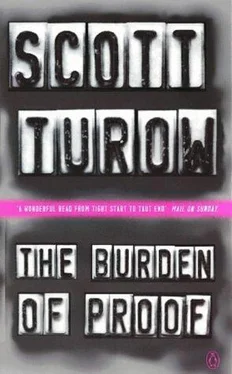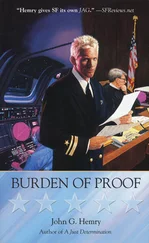Scott Turow - The Burden of Proof
Здесь есть возможность читать онлайн «Scott Turow - The Burden of Proof» весь текст электронной книги совершенно бесплатно (целиком полную версию без сокращений). В некоторых случаях можно слушать аудио, скачать через торрент в формате fb2 и присутствует краткое содержание. Жанр: Детектив, на английском языке. Описание произведения, (предисловие) а так же отзывы посетителей доступны на портале библиотеки ЛибКат.
- Название:The Burden of Proof
- Автор:
- Жанр:
- Год:неизвестен
- ISBN:нет данных
- Рейтинг книги:3 / 5. Голосов: 1
-
Избранное:Добавить в избранное
- Отзывы:
-
Ваша оценка:
- 60
- 1
- 2
- 3
- 4
- 5
The Burden of Proof: краткое содержание, описание и аннотация
Предлагаем к чтению аннотацию, описание, краткое содержание или предисловие (зависит от того, что написал сам автор книги «The Burden of Proof»). Если вы не нашли необходимую информацию о книге — напишите в комментариях, мы постараемся отыскать её.
The Burden of Proof — читать онлайн бесплатно полную книгу (весь текст) целиком
Ниже представлен текст книги, разбитый по страницам. Система сохранения места последней прочитанной страницы, позволяет с удобством читать онлайн бесплатно книгу «The Burden of Proof», без необходимости каждый раз заново искать на чём Вы остановились. Поставьте закладку, и сможете в любой момент перейти на страницу, на которой закончили чтение.
Интервал:
Закладка:
The letter.Dixon had faxed, however, offered some insight.
It was from his personal banker at First Kindle, who announced that yet another grand jury subpoena had been served on the bank more than a month ago. According to the letter, agents had visited the bank and briefly reviewed the statements for Dixon's checking accounts. Then, pursuant to the subpoena's command, they had required copies of all items Dixon had deposited and the checks he had written over the last year. This was an exhaustive task, requh-ing clerks to search through reels of microfilm, but the bank was scheduled to finally produce these items next week. The FBI, as usual, had requested confidentiality, yet the banker, after consultation with his lawyers, had determined to advise Dixon should he wish to venture any objection. The letter portrayed this gesture as an act of heroic defiance in behalf of a valued customer, but it was, in truth, routine.
"What does it mean?" asked Dixon.
Many things, Stern knew. Certainly that Dixon was the target of th9 government's inquiry; and that somehow they had figured out where Dixon banked. At this point, a few months ago, Stern would have lit a cigar as a way to gather a moment to think. His fingers still wandered toward the handsome crystal ashtray on his desk, as if the nerves had some instinct of their own. It was twenty-nine days, by his calculation, since he'd had his last cigar, the day he flew off to Chicago. This was a lugubrious South American notion, he knew, the idea of a penance, moth-eaten Catholic baggage he was still lugging around from his adolescence, and he a Jew at that. It was typical of the entirely unpredictable ways that Argentina would episodically haunt him.
"It means, I would think," said Stern, "that the government is attempting to trace money. They believe, Dixon, that you somehow unlawfully profited from these enormous trades they are scrutinizing."
Dixon was quiet.
"It's a bunch of crap," he said finally. "What do they think? I stole all fhis money and mailed it right into my checking account so I could be sure someone would notice?
How stupid am I supposed to be?"
Stern did not answer. In his indignation Dixon was convincing, but the sequence of events described'by the banker-the fact that the agents had reviewed the statements first-gave every indication that they believed they were on the right track. Dixon had admitted last time that the orders the government was investigating were large enough to significantly alter market prices. Perhaps Dixon had been paid off by traders on the market floor for informing them about his customers' plans. That would fit.
The prosecutor would want to examine any personal checks Dixon had received from other members of the exchanges.
"And if they're tracing money I deposit, what do they need my goddamn canceled checks for?" Dixon asked.
"Generally, your checks are desired not for what is on the frOnt but on the rback." Dixon did not seem to under stand.:'By examining the endorsements, Dixon, they are able to identify other accounts, other financial institutions with whom you have dealings. If they do not find what they are seeking in this account, they will move on to the others."
"Great," said Dixon. He went quiet again/Stern, in the interim, scribbled a quick draft of a letter to the bank, asking for copies of the subpoena and whatever they produced to the government. As the bankers' lawyers well knew, there were no grounds to prevent the bank from complying.
"This gal is really a pistol," Dixon said. He was speaking apparently of Klonsky. "She wants everything. Margy told me the records they subpoenaed already take up half a room." A few boxes, is what Margy had said to Stern, but he would see for himself. He was going to Chicago next week to review the documents before turning them over to the government. "You know what they call her, don't you?" Dixon asked.
"Klonstadt? Have you heard this? The Titless Wonder." Dixon laughed.
On Friday nights at Gil's, within whose mock-elegant foil walls the federal practitioners gathered to pass information about ongoing trials and the tribulations of practice, Stern had heard the nickname.
That kind of emel humor had never been much to his taste.
Dixon was deeply aggrieved. Aggravated. Hounded. Ms. Klonsky's resourcefulness exceeded his expectations. And in his gruff effort to insist that this vulgarity was funny, Stern, for the first time, detected a familiar tone. Stern had listened to it for decades. The willies or the creeps.
Call it what you like. It was the sound of incipient internal corrosion, of inner fortifications giving way.
That abandoned edge in Dixon's voice touched Stern himself with the cold trickle of something close to fright.
Clearly, given his new knowledge of the prosecutor's nickname, Dixon had found himself unable to obey Stern's advice not to' talk about the investigation. Instead, in the steam bath at the club, or in some corner of the locker room where he usually talked grain prices or the girls on the floor he'd like to screw, Dixon had bellied out his troubles to somebody-a lawyer probably, given the information he had retrieved. One could only hope it was someone discreet.
"Do you know what the latest is?" Dixon asked. "I'm not supposed to have heard this, but two FBI agents have been up at Datatech all week looking over records on one of the MD accounts. I picked that up today."
Stern made a deeper sound. No wonder Dixon was feeling surrounded.
Datatech was Dixon's data-processing vender, Which prepared the computer tabulations on all of MD's accounts.
"Which account, Dixon?"
"The house error account."
"What is that, please?"
"Just what it sounds like. Where we clear up mistakes.
Customer wants to buy two cars of herons and we buy him corn instead.
When we notice what we've done, we'll buy him beans and move the corn into the house error account, so we end up owning the corn instead of the customer."
"And the government wants the records of this account?"
"Better than that. The jokers asked Datatech to Put together a special computer run. They just want errors made on trades on the KCFE." The Kindle County Futures Exchange.
"Kindle?" asked Stern.
"Right. It doesn't make sense, does it??"
"No," answered Stern simply. The customer trades about which the government had been subpoenaing information previously had all been executed on the Chicago Exchange.
The errors which the government now wished to examine arose, according to Dixon's information, from trades placed on the smaller exchange here.
It was like investigating transactions on the New York Stock Exchange by requesting records from the Pacific Stock Exchange in San Francisco.
Baffling. But there was something in Dixon's uneasy tenor which suggested to Stern that the government was on the right trail. "From whom do you hear these things, Dixon?
About the FBI at Datatech?"
"I got that on the QT. They fouled their britches over at Datatech when they saw the subpoena. I pay those jagoffs three hundred thousand dollars a year, and now they promise to keep this a secret from me."
"Just so," said Stern. "But you have reason to believe in the accuracy of this information?"
"A young lady," said Dixon finally. "I've known her for some time. She wouldn't give me any malarkey. I promised this wouldn't come back on her. I don't want Titless hearing about it."
"Of course." For Dixon, like the others on the exchanges, his word given was exalted. To someone's back a knife could be freely applied, but a deal made eye to eye could not be broken.
"How long is she going to keep this up, anyway," Dixon asked,
"what's-her-name, Kronstadt?"
"Klonsky," said Stern. "There is no telling."
"Months?"
Читать дальшеИнтервал:
Закладка:
Похожие книги на «The Burden of Proof»
Представляем Вашему вниманию похожие книги на «The Burden of Proof» списком для выбора. Мы отобрали схожую по названию и смыслу литературу в надежде предоставить читателям больше вариантов отыскать новые, интересные, ещё непрочитанные произведения.
Обсуждение, отзывы о книге «The Burden of Proof» и просто собственные мнения читателей. Оставьте ваши комментарии, напишите, что Вы думаете о произведении, его смысле или главных героях. Укажите что конкретно понравилось, а что нет, и почему Вы так считаете.












